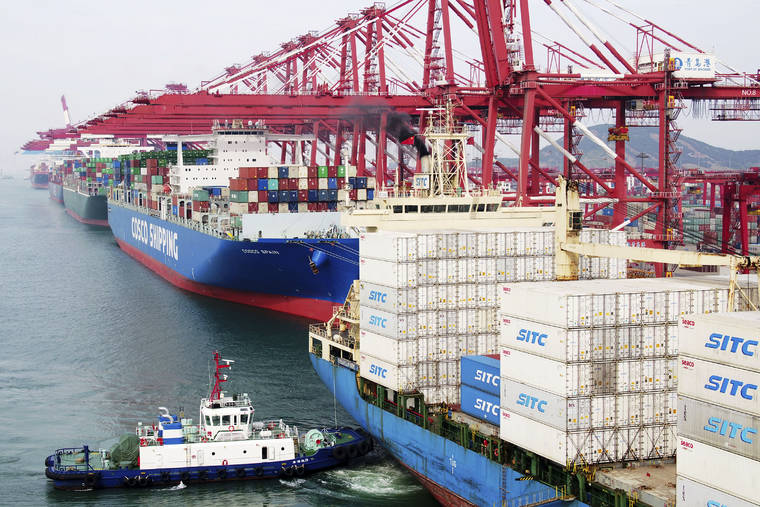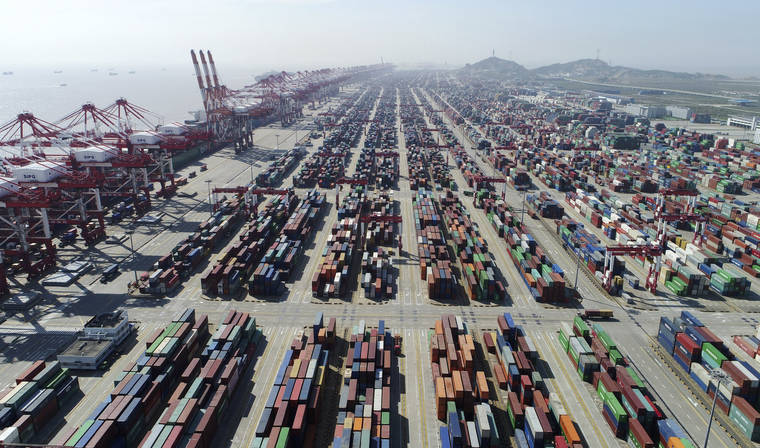BEIJING — President Donald Trump’s latest tariff hike on Chinese goods took effect Friday and Beijing said it would retaliate, escalating a battle over China’s technology ambitions and other trade strains.
The Trump administration raised duties on $200 billion of Chinese imports from 10% to 25%. China’s Commerce Ministry said would take “necessary countermeasures” but gave no details.
The increase went ahead after American and Chinese negotiators began more talks in Washington aimed at ending a dispute that has disrupted billions of dollars in trade and shaken global financial markets.
American officials accuse Beijing of backtracking on commitments made in earlier rounds of negotiations.
The talks were due to resume Friday after wrapping up with no word on progress.
“China deeply regrets that it will have to take necessary countermeasures,” said a Commerce Ministry statement.
Shares in Asia were mixed Friday amid renewed investor jitters about the possible impact of the trade battle on global economic growth.
The latest increase extends 25% U.S. duties to a total of $250 billion of Chinese imports. Trump said Sunday he might extend penalties to all Chinese goods shipped to the United States.
Beijing retaliated for previous tariff hikes by raising duties on $110 billion of American imports. But regulators are running out of U.S. goods for penalties due to the lopsided trade balance.
Chinese officials have targeted operations of American companies in China by slowing customs clearance for their goods and stepping up regulatory scrutiny that can hamper operations.
The higher U.S. import taxes don’t apply to Chinese goods shipped before Friday. By sea, shipments across the Pacific take about three weeks, which gives negotiators a few more days to reach a settlement before importers may have to pay the increased charges.
The negotiators met Thursday evening. Then, after briefing Trump on the negotiations, U.S. Trade Representative Robert Lighthizer and Treasury Secretary Steven Mnuchin dined with the leader of the Chinese delegation, Vice Premier Liu He.
Liu, speaking to Chinese state TV on his arrival in Washington, said he “came with sincerity.” He appealed to Washington to avoid more tariff hikes, saying they are “not a solution” and would harm the world.
“We should not hurt innocent people,” Liu told CCTV.
At the White House, Trump said he received “a beautiful letter” from Chinese President Xi Jinping and would “probably speak to him by phone.”
The two countries are sparring over U.S. allegations that China steals technology and pressures American companies into handing over trade secrets, part of an aggressive campaign to turn Chinese companies into world leaders in robotics, electric cars and other advanced industries.
This week’s setback was unexpected. Through late last week, Trump administration officials were suggesting that negotiators were making steady progress.
U.S. officials say they got an inkling of China’s second thoughts about prior commitments in talks last week in Beijing but the backsliding became more apparent in exchanges over the weekend. They wouldn’t identify the specific issues involved.
A sticking point is U.S. insistence on an enforcement mechanism with penalties to ensure Beijing lives up to its commitments. American officials say China has repeatedly broken past promises.
China wants tariffs lifted as soon as an agreement is reached, while U.S. officials want to keep them as leverage to ensure compliance.
Canadian Prime Minister Justin Trudeau urged Trump in a phone call to press China to release two Canadians who have been held for five months.
The men were detained in apparent retaliation after Canada arrested an executive of Chinese tech giant Huawei on U.S. charges of bank fraud.



